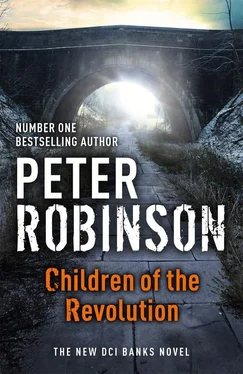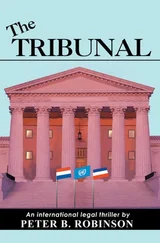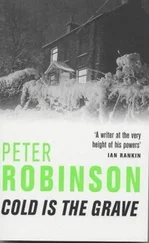The postage-stamp garden had been given over to the growing of herbs. Banks had been cultivating a similar patch himself over the summer, and he recognised thyme, dill, parsley, rosemary and chives. The key turned easily in the lock, and it was a relief to get inside out of the rain. Banks and Winsome were still wearing their protective suits and gloves so they could make a quick search of Gavin Miller’s house without contaminating the scene before the CSIs came to turn the place over.
Banks fumbled for the light switch and found it to the right of the door. A shaded bulb in a ceiling fixture illuminated a small living room, with just enough space for a couple of well-worn maroon armchairs, a small bookcase, a fireplace complete with tiled hearth and mantelpiece, and a desk by the window, which looked out through grubby, moth-eaten lace curtains over the footpath and the fields to the south, with the railway embankment, woods and bridge just visible to the left. The cream wall-to-wall carpet was marked by two large wine or coffee stains in the shape of Australia and Africa, the wallpaper was peeling in places where it reached the ceiling, and a few abstract prints in cheap frames hung on the rose-patterned walls. No family photographs stood on the mantel or on the desk. The chilly room smelled of stale smoke, as if it hadn’t been aired or vacuumed in a while, and the layer of dust on the mantelpiece and desk bore this out. Banks remembered that Miller had a packet of Silk Cut in his pocket.
The desk had clearly been used recently, as the dust had been disturbed, and the computer that sat there wasn’t dusty at all. The power light was on, screen saver showing a swirling pattern of psychedelic designs, and a squat black Wi-Fi hub stood on the window ledge, its blue lights steady. Beside it sat a green tin ashtray advertising John Smith’s Bitter, in which were a number of stubbed-out cigarettes, the ends of the filters stained brown. Banks eyed the computer greedily. It might contain information that would help him find out what happened to Gavin Miller, but he knew better than to touch anything. When you find a computer at any scene connected with a possible crime, you don’t check the user’s browsing habits; you leave it for the experts.
Banks and Winsome searched through the desk drawers and found stationery, mini-USB drives, old backup CDs, chargers and various connecting wires. In one of the side drawers Banks found an envelope full of old photos: a pop festival of some kind, the stage way off in the distance; a picket-line scuffle, police in riot gear; a student demo; a city Banks didn’t recognise, tall buildings glinting in the sun; a group of people standing outside a modern building; more groups at restaurants and on beaches; mountains and a sheltered bay; a deep blue lake reflecting the fir trees on the hills that surrounded it, snow-capped mountains in the background. That was it: some black and white, some colour, no portraits, no dates, no names, no indication whether Miller had taken them.
The books were mostly paperback British and European literary classics, from Robinson Crusoe to L’Étranger . There was also a shelf of literary criticism and general non-fiction: Sartre’s Being and Nothingness , Kierkegaard’s The Sickness Unto Death , F.R. Leavis’s The Great Tradition . Heavy reading, Banks thought.
A door with a broken handle led into the kitchen, beyond which was a tiny downstairs toilet and washbasin. The kitchen was surprisingly tidy, dishes washed and standing in the rack beside the sink, all surfaces wiped clean. There wasn’t much food in the fridge except for some wilted broccoli and leftover chicken tikka masala in a plastic container. Still, Banks wasn’t one to speak. Anyone who took the trouble to look would find the same in his fridge as often as not, except he didn’t bother with the plastic container. The green box by the door was full of empty wine bottles — cheap wine, Banks noticed — mixed in with a few whisky bottles, also cheap brands often on sale at Bargain Booze. It looked as if Miller preferred to stop in to do his drinking. If he was as reclusive as PC Kirwan had suggested, he probably did it alone.
Up a flight of narrow, uncarpeted stairs were two bedrooms and a bathroom, complete with a small walk-in shower. A cursory inspection of the bathroom cabinet showed only the usual: razor, shaving cream, Elastoplast, and a selection of over-the-counter medications such as paracetamol, Alka Seltzer and acid reducers. There were also two prescription medications: an old bottle of heavy-duty painkillers, still half full, and a more recent one of Ativan, sublingual. Banks could see no signs of a toothbrush, toothpaste or deodorant. One bedroom was large enough to hold a double bed, wardrobe and dresser, and it was clearly where Miller had slept. The bed was unmade, strewn with discarded underwear, socks and shirts. An MP3 player lay on the bedside table next to a glass of water, in which a dead fly floated, and a digital clock radio. Banks turned on the radio. It was tuned to Radio Two.
Winsome shivered. ‘A bit parky in here, isn’t it?’
‘The radiator’s not turned on,’ said Banks. ‘He must have been counting his pennies.’
‘With five grand in his pocket?’
Banks shrugged.
The second bedroom seemed to be Miller’s den, similar in a way to Banks’s entertainment room at Newhope Cottage. There was a cheap laptop computer and the obligatory flat-screen TV hooked up to a fine surround-sound system, which was also connected to a turntable. Most of the equipment was fairly old, Banks noticed, at least three or four years, which is old for electronics. Gavin Miller’s music collection began and ended with the sixties and very early seventies, and most of it was on vinyl. There was plenty of Soft Machine, Pink Floyd and Jimi Hendrix, and a lot of Grateful Dead, some of the LPs still plastic-wrapped.
‘A Dead Head,’ Banks muttered.
‘Pardon?’ said Winsome.
Banks pointed to the rows of albums, CDs, DVDs and the blow-ups of the American Beauty and Live Dead album covers on the wall. ‘It’s what they call people who are fanatical about the Grateful Dead. It used to refer to people who followed the band around from gig to gig. How old was Miller? Did you check?’
‘Fifty-nine,’ Winsome said.
‘Jesus Christ!’ said Banks, shocked that Miller had turned out to be close to his own age. ‘He looked to be in his seventies.’
‘That’s what a hard life will do to you, sir.’
Banks gazed at her curiously, wondering if that was one of her cryptic warnings. ‘He’s about the right age, then,’ he said finally. ‘For the Grateful Dead and all that.’
‘Are you one, too, sir? A Dead Head?’
Banks laughed. ‘Me? No. I just like to listen to them sometimes. And don’t be cheeky. I’m not fifty-nine, either. It certainly doesn’t seem as if anyone has broken in here, does it? There weren’t any damage to the door, and the electronic stuff is all intact. It’s old, mind you, but it might fetch a few quid at a car boot sale. Some of these records are probably worth a bob or two to a collector.’
‘How many burglars have you met who’d know a valuable LP from a hole in the ground?’ said Winsome.
‘Maybe they get a better class of burglar around Coverton?’
Winsome gave him a look. ‘More likely, if anyone did break in, they were after something specific and not interested in a stack of old vinyl and posters. And they were clever enough to enter and leave the place as it was.’
Banks glanced at the DVDs and saw that Miller was a serious film buff. His shelves housed an extensive collection of foreign art-house films from such directors as Tarkovsky, Almodóvar, Fellini, Kurosawa, Truffaut, Ozu and Godard, along with a stack of Sight & Sound magazines, right up to the previous month’s issue.
Читать дальше












